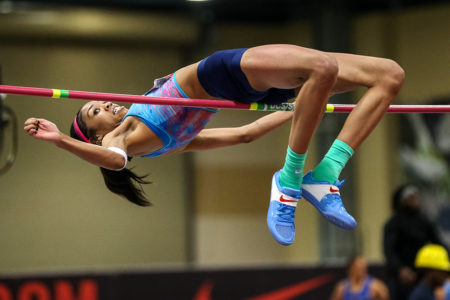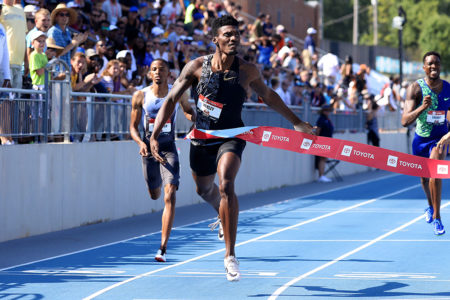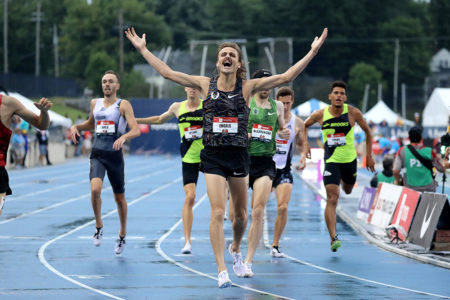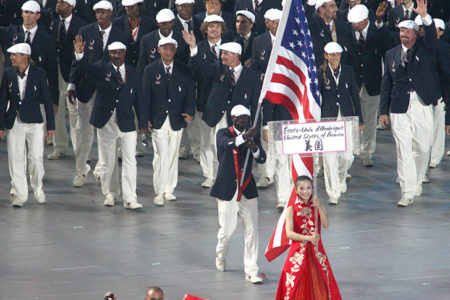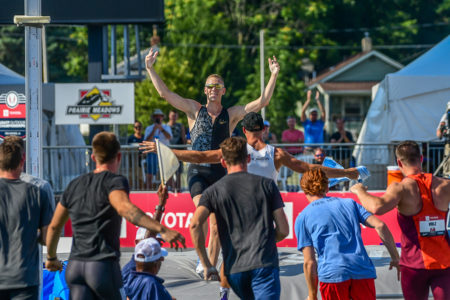
A USATF notebook as a tense 4 days of track & field in Des Moines sorted out the U.S. team for the World Championships:
MATTHEW CENTROWITZ, stoked for Doha, said, “I am more excited where I am right now and giving myself another 2 months to really prepare. I know I was so far behind to start the season. I think there’s going to be a lot of guys, not just Americans, but worldwide, coming back with this late World Championship. I promise you that if I am able to stay healthy the next 2 months I’m going to be in pretty damn good shape.”
Hurdler Devon Allen is another who is looking forward to extra prep time for Doha. “Track & field, we put a lot of pressure on us to perform. Throughout the season, depending on where you are in the profession, you think you should be better or worse,” he said. “I’m glad I made it so my season is pushed for another 2 months and I got some time to fix what I got to fix and get healthy.”
NCAA discus champ Laulauga Tausaga-Collins flirted with disaster in Des Moines, fouling two of her first three throws before making the team in 3rd: “I thought, ‘You know what, I’m not going to let this ring conquer me.’”
Clayton Murphy, foiled in defending his 800 title, said, “I knew I was fit. I’m probably not as sharp as I could have been.” He has a new tattoo that reads, “Family over everything.” He explained, “That’s who I go to first after a success, that’s who I go to after defeat.”
After winning her second straight discus crown, Valarie Allman turned her focus to Qatar: “For me I think [the key is] having a clear technical plan and going in and executing the one or two things we have been working on. My coach has done a good job of figuring out what those are. Our goal going into Worlds is to refine and feel really confident going into the competition. We have tried to work on being efficient.”
After making the U.S. team in her first meet as a professional, steepler Allie Ostrander said she doesn’t want to be typecast as a barrier expert: “I don’t want to stay a steeplechaser. I want to give the 10K another try as well as the 5000 and 1500. I want to explore other events.”
Heptathlon 3rd-placer Chari Hawkins said her secret was sticking to a simple rule: “Don’t want your highs too high and you don’t want your lows too low, those were my keys to my events.”
In taking 3rd in the 800, Bryce Hoppel of Kansas could not have been happier. “It was incredible. I got out there and raced and left it all out there. Ran for my life on the last stretch,” he said. “After seeing some of the other guys start to go, I knew I had to go, too. It’s incredible to be mentioned with two people I’ve looked up to.”
Paul Chelimo dictated the anything-but-even pace in the early going of the 5000 and explained why the latter stages of the race looked a bit more normal: “It’s tough. I wanted to win, but it didn’t happen. But I did my best. I put it all out there and gave it everything I could. I don’t think I could have done anything different. I was going for the win but I realized they were working against me, so I just wanted to do my best.”
Michael Norman likes to have fish for a post-race meal. To the extent that following his heat, he quipped to reporters, “I’m physically hungry… I found a pond.”
5K runner-up Karissa Schweizer had nothing but praise for winner Shelby Houlihan, her Bowerman teammate, saying, “It means so much to me because I have looked up to her so much and she has been a huge mentor for me, helping me in every way. I lived with her for half a year and it feels like she’s an older sister to me. Her helping me has gotten me to this point so far.” What impresses her most about Houlihan? “To see what she went through and her struggles. Being able to dial into the program and having no doubts and believing in yourself.”
The veteran of veterans at 37, Justin Gatlin on major meets: “I don’t care how big of an athlete you are, you always have first-round jitters.”
Mike Rodgers on how he is still sprinting at a high level now that he’s 34: “Just eating healthy, staying busy. Kids, of course.”

Kerron Clement, at 33 another longtime vet, finished 8th in the 400H final and said, “I’ve been dealing with a lot of [hamstring] injuries so I’m really happy to be back. I’m glad I’m healthy at the right time of the year. I’m pretty much the old man in the group. I love being under pressure and on the big stage… that’s when I’m at my best.”
Raevyn Rogers, who missed the 800 team by a spot in ’17, remembered that anguish during a final drive that got her 3rd this time around. “I was just trying to get to the finish line,” she said. “I didn’t feel anyone was close, but I wanted to make sure I secured my spot. In the race it didn’t seem like I was third so I was pleased. I remember the last Worlds I was literally breaking down crying.”
Vaulter Katie Nageotte is hoping to make a big impact at Doha. “When you join the elite level, all you are told is that you need to make outdoor World teams. It has taken me 6 years, but I’m just ecstatic that I’m not only making the team but I’m in a position to hopefully medal,” she said.
Conor McCullough was more than thrilled over his big hammer toss. “A PR is always what you are aiming for. That’s the beauty with track & field, you’re always aiming to better yourself. And after so many years, it feels tough at times, but that’s how you grow up. After making the changes I made and working through it, it’s really been spectacular to get the big throw.”
Colleen Quigley is hoping she is in condition to leave Doha with better steeplechase memories than the ones she brought home from London, where she was DQed in the heats. “I’m just working out hard every day, all the time and trying to just incrementally get better,” she said. “It’s not like I’ve done any kind of crazy switches in my program. Not doing any crazy different workouts or different things in the gym. It’s just cumulative work that hopefully without injury, we can just keep stacking workouts together and get strong. There’s no magic pill, there’s no magic exercise or workout to get there.”
Prep Athing Mu, still barely 17, made a big impression, even if she didn’t make the 800 team. Said Ajee’ Wilson, “I think Athing is super-talented and I think the biggest thing is now she doesn’t have any fear when she races and she’s proven that she can hang with the best of us.” Said Mu, “I just come into the race remembering whatever happens, I’m just here for fun and I’m the youngest person here. I’ve many years to come back and improve whatever I do now. After running my first international meet in October [the Youth Olympic Games], I got over the nerves and remembered I’m doing this for fun.”
Making the 100 team took a lot of faith for Morolake Akinosun. “It’s been such a long road for me,” explained the Texas alum. “I tore my Achilles in February of 2018. And I spent the last year not just training, but rehabbing and doubting myself and trusting in myself and just figuring out how to get back to where I know I should be and where I can be. And I’m just so grateful. God’s just so good, so faithful. There’s no way I’d be here without that.”
Kenny Bednarek is now a pro sprinter after one year of JC. He said, “I had a goal to go to university after JUCO, but obviously God had a different plan. I ran faster than I expected but I knew I had the talent and all that stuff to get here. But, you know, it came sooner than later.”
Few are as observant about the racing process as Jenny Simpson. She noted after the 1500, “It’s so funny the weird things that go through your mind. Sometimes you’re standing on the starting line and you smell people’s hot dogs and you’re like, ‘Why is that on my brain right now?’” ◻︎
